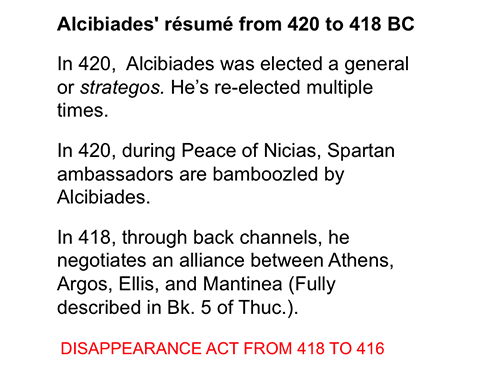












The 10 Strategoi represented the executive branch of the Athenian system. They were elected annually by the demos—one of the few offices of the Athenian democracy that wasn’t decided by a lottery system. But in another sense the city was actually run by the demos as gathered in the popular assembly, and the strategoi, like Alcibiades, had to figure out the most effective ways to manipulate the voters.
Alc. had private meetings with the Spartans and convinced them to fib to the Athenian assembly and say that they couldn’t make decisions on their own, because they hadn’t been empowered to do so by the government of Sparta. The ambassadors went along with Alcibiades and represented themselves to the Athenian Assembly exactly the way that Alcibiades had instructed. At that point, Alcibiades stood up in the assembly and denounced the ambassadors as bald-faced liars who were trying to deceive the Athenian people. The Spartan delegates were totally dumbfounded by Alcibiades’ double cross and reported back to Sparta that the Peace of Nicias was in serious jeopardy—precisely what Alcibiades had hoped to accomplish.
Alcibiades did all this because he wanted the Peace of Nicias to fail. His hope was to send the disgraced Spartans empty-handed back home to Sparta and to begin a series of intricate and remarkably clever negotiations with the democratic factions of the city of Argos. This is all told in Book 5 of Thucydides’ histories, where we see an energetic and conniving Alcibiades commuting between Athens and Argos and arranging for a Peloponnesian alliance that could very well have ended Spartan dominance in the Peloponnese and handed Athens a victory over their long-standing enemy.